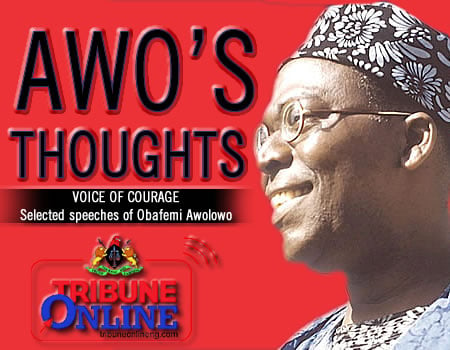ALL these, by themselves, are quite enough to support the assertion that the Macpherson Constitution, and hence the year 1951, marks a clear, bold and indelible line of demarcation between British regime in Nigeria and Nigerian Home Rule. But there are other epoch-making features and events inseparable from the constitution, which are worth mentioning.
Firstly, with the introduction of the Macpherson Constitution, Nigeria took the first definite step on the road to federalism. In a strict scientific sense, the constitution itself can only be described as quasi-federal: Residual powers were vested in the Central legislature; no Regional law could become operative without the prior approval of the Governor; and the House of Representatives, as well as the Council of Ministers depended on the whims and caprices of the Regional legislatures for its Nigerian members. This dependence, in the case of the Council of Ministers, was so absolute that the political parties in the Regions could render it completely impotent.
In fact, a situation arose in 1953 which severely shook the Council of Ministers and threatened its existence. The Ministers from the Western Region, in obedience to a party directive, had resigned their seats in the Council, on the issue of a motion for self-government for Nigeria in 1956. With the absence of all the representatives of one of the three Regions from the Council, the legality of what remained of it became the subject of keen discussions both in Nigeria and the United Kingdom. In order to remedy the situation, the Governor decided to fill the vacancies.
He and the remaining Nigerian Ministers did not like to have further association in the Council with two of the resigned Western Ministers. On the other hand, the party in power in the Western Region was adamant that the Region was not going to be represented by other than those four former Ministers who had surrendered their portfolios in the fight for Nigerian independence, and in unquestioning obedience to their party. Not daunted, the Governor nominated his four candidates; but they were rejected by the unanimous vote-taken by secret ballot-voting of the Joint Council. And so the deadlock remained. As time went on, however, he relented and decided to bow to the wishes of the party in power in the Western Region. But he was promptly confronted with the threat of resignation by the four Ministers from the Northern Region! Anyway, wiser counsels eventually prevailed, and the four former Ministers from the Western Region were nominated by the Governor and were duly re-elected to the Council of Ministers.
This incident demonstrates, beyond any equivocation, the tightness and precariousness of Macpherson’s brand of quasi-federal constitution. It was obvious that some of its provisions had not taken account of certain kinds of human foible, temperament, and behaviour. And as we have said before, it had not envisaged the emergence of a disciplined party system. But even with all these defects, it remains true to say that the credit (or discredit, if you like), for sowing the seeds of federalism in Nigerian administration belongs to the Macpherson Constitution.
Secondly, the ‘indirect rule’ system – a source of much irritation to Nigerian nationalists – died a natural death under the Macpherson Constitution.
After Nigerians had assumed the reins of power, albeit ingeniously, it ceased to be practical politics for Traditional Rulers to look upon the Residents or Lieutenant-Governors as their principals in the business of public administration.
In spite of themselves, they soon realised that, thenceforth, they had to depend on the goodwill of their people alone for a long, peaceful and successful reign. The vestiges of the Sole Native Authority system are still to be found in some parts of the Northern Region; but in spite of this, all Native Authorities (now known in the South as Local Governments) are now responsible to the people through Nigerian Ministers.
Thirdly, partnership, in the true sense of the word, between the British and Nigerians in the administration of Nigeria, began only with the introduction of the Macpherson Constitution. British protestation of the existence of such a state of affairs, before 1952, was brazen hypocrisy, and false in the extreme. One might as well regard the office cleaner in a big business concern as a partner in the venture simply because the undertaking had been organised to exploit natural resources exclusively belonging to the cleaner.
CONTINUES NEXT WEEK
COVID-19: FG Expresses Worries Over Mass Transportation Of People Out Of Lagos In Trucks
The Presidential Task Force on the coronavirus pandemic has alerted on what it called ‘mass transportation’ of people out of Lagos State in trucks, thereby worsening the spread of the disease… Read full story
Health Workers That Demand Fee For COVID-19 Test Will Be Sanctioned ― LASG
LAGOS State government (LASG) has said tests for COVID-19 are free of charge in all designated screening centres across the state… Read full story
We Want Our Tailors To Start Using Ankara, Others To Make Face Masks, Says Boss Mustapha
The Presidential Task Force on the coronavirus pandemic has asked the Nigerian garment factories especially tailors all over the country to start producing face masks using local fabrics such as Ankara and others… Read full story
(UPDATE): Faces Of Four Suspected Killers Of Afenifere Leader’s Daughter
The Inspector General of Police, Muhammed Adamu, on Thursday confirmed the arrest of four men suspected to have murdered Mrs Funke Olakunrin, the daughter of the leader of Afenifere, a pan-Yoruba sociocultural group, Pa Reuben Fasoranti… Read full story
COVID-19: FG Threatens To Close Down Private Hospitals Engaging In Unauthorised Treatment
THE Federal Government (FG) threatened on Thursday that it would close down private hospitals that engage in unauthorised treatment of COVID-19, warning that the country cannot afford avoidable morbidity… Read full story






